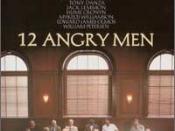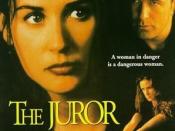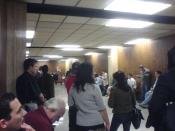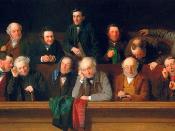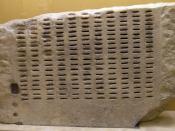Twelve angry men is the perfect example of the conflict that arises when logic and emotion collide. The play revolves around the trial of a young man who is accused of murdering his father. Twelve strangers are hand picked to choose this boy's fate. They must decide if he murdered his father in a rage or if he is just being prosecuted because he is the only and most logical suspect. The evidence against this troubled boy is very strong. A woman said she saw the boy kill his father from across the train tracks through a window. A man in the apartment below the boys said he heard the boy say, " I am going to kill you, " and then hear a body hit the ground. After that the man ran to the door and said that he saw the boy running down the stairs. On the night of the murder, the boy had no witnesses to help him prove that he was at the movies during the killing.
The boy also could not remember anything about the movies that he went to. The owner of a pawnshop also stated that he sold the boy a knife identical to the one that was used to kill his father. The last bit of evidence was a motive for killing his father because of an argument that the two had the night of the murder.
When the twelve men are moved into the jury room, the majority of them expect a unanimous guilty conviction but when the vote is taken, juror number eight votes "not guilty"�. The other eleven jurors immediately begin to question the man and soon realize they cannot bully him into changing his vote to something he does not believe in.
The other jurors begin to try and convince the man that the defendant is guilty beyond a reasonable doubt but instead he in turn begins to slowly sway each of them into a "not guilty"� verdict. Each juror votes guilty for different reasons. Every member has a different background, prejudices and morals. For instance, juror number 10 is very sarcastic and uses peer pressure to sway people's decisions. Juror number seven often raised his voice and believed that this would have an affect on the other jurors decisions. Number eight used reasonable arguments and common sense to make his points. He believed that the defendant was actually guilty until proven innocent. He did not let his emotions or prejudices get in the way of his decision. He proceeds convince the jury to base their decisions on the facts and not on their emotions or bias. Slowly the other eleven jurors change their votes from "guilty"� to "not guilty"�. By the end most of the jurors were applying their common sense and practical reasoning for their specific situation. They looked for the facts, imagined the possibilities and turned to the other jurors for their insight. The jurors also began to view their own values and morals in a new light, and in the end made the proper decision.
